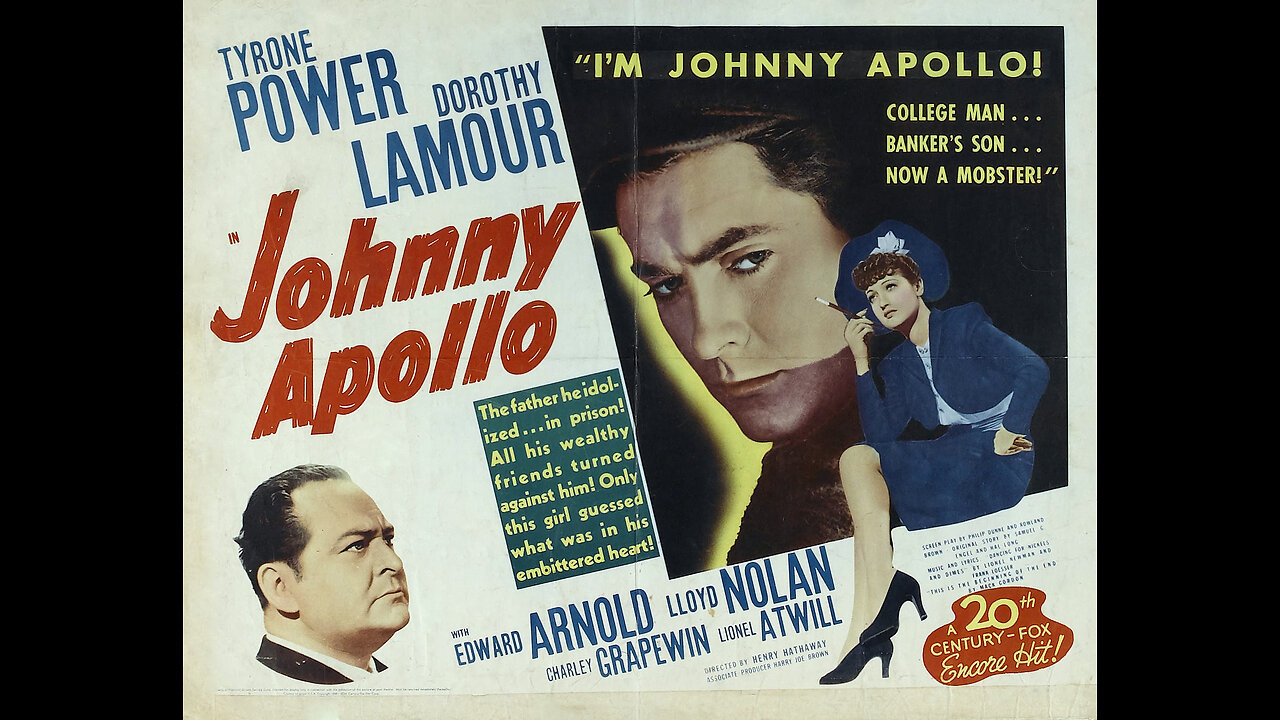Premium Only Content

Johnny Apollo (1940) | A crime drama film directed by Henry Hathaway
"Johnny Apollo" is a crime drama film directed by Henry Hathaway and released in 1940. Starring Tyrone Power, Dorothy Lamour, and Edward Arnold, the movie blends elements of family drama, crime, and redemption. The story follows the journey of a young man who descends into a life of crime to help his imprisoned father, only to face the consequences of his actions.
Tyrone Power stars as Bob Cain Jr., the son of wealthy industrialist Robert Cain Sr. (Edward Arnold). When Cain Sr. is convicted of embezzlement and sentenced to prison, Bob Jr. decides to take matters into his own hands to secure his father's release. In an attempt to raise money for legal fees, Bob becomes involved with a group of criminals led by Mickey Dwyer (Lloyd Nolan).
Under the alias Johnny Apollo, Bob participates in a bank heist but soon finds himself caught by the authorities. As a result, he is sentenced to prison, facing the harsh realities of his misguided attempt to help his father. Within the prison walls, Bob encounters a variety of characters, including the sympathetic Stacey (Dorothy Lamour), who becomes an important figure in his life.
The film explores themes of crime, punishment, and redemption as Bob grapples with the consequences of his actions. It also delves into the complexities of family dynamics, wealth, and societal expectations. As Bob navigates the challenges of prison life, the narrative evolves into a character study of a young man coming to terms with his mistakes and seeking a path to redemption.
The performances in "Johnny Apollo" are noteworthy, with Tyrone Power delivering a compelling portrayal of a character torn between loyalty to his family and the moral consequences of his choices. Edward Arnold brings gravitas to the role of the disgraced father, and Dorothy Lamour adds depth to the film as the sympathetic love interest.
Henry Hathaway's direction contributes to the film's noirish atmosphere, incorporating elements of crime drama and moral ambiguity. The cinematography, by Tony Gaudio, captures the shadows and contrasts typical of films from this era.
The musical score, composed by David Buttolph, complements the film's emotional beats and underscores the dramatic moments throughout the narrative.
"Johnny Apollo" may not be as well-known as some other films of its time, but its exploration of crime and redemption, coupled with strong performances and atmospheric direction, makes it a notable entry in the classic Hollywood crime drama genre. The film reflects the moral dilemmas faced by its characters and offers a nuanced exploration of the consequences of one's actions in the pursuit of justice and familial loyalty.
-
 DVR
DVR
RiftTV
4 hours agoBREAKING: Trump FEDERALIZES D.C. To RESTORE Law & Order | The Rift | Ryan Matta, Olivia Krolczyk + Braeden Sorbo
11.3K1 -
 LIVE
LIVE
megimu32
2 hours agoOTS: Breakfast Nostalgia + Blind Chocolate Cereal Showdown… LIVE! 🍫🥣
118 watching -
 LIVE
LIVE
LIVE WITH CHRIS'WORLD
9 hours agoLIVE WITH CHRIS’WORLD - It’s Called LAW & ORDER
175 watching -
 11:07
11:07
AlaskanBallistics
1 day agoBreek-Lok Quick Detach Hub Mount and Flash Hider System Review
2.92K -
 57:44
57:44
Donald Trump Jr.
6 hours agoExclusive Interview with Deputy Secretary of State Chris Landau | Triggered Ep266
92K39 -
 58:40
58:40
BonginoReport
10 hours agoModern Dating Woes & How To Resist Temptation w/ Tilly Dillehay - Hayley Caronia (Ep.109)
31.9K13 -
 53:55
53:55
The Quiet Part
9 hours agoThey Want You to Sign Over Your Life Insurance—So They Can Keep Lying to You
11K9 -

The Mike Schwartz Show
6 hours agoTHE MIKE SCHWARTZ SHOW Evening Edition 08-11-2025
13K4 -
 DVR
DVR
Quite Frankly
6 hours ago"D.C. Crackdown, Weekend News, World-Changing Inventions" 8/11/25
12.8K4 -
 1:25:09
1:25:09
Kim Iversen
4 hours agoTrump’s DC Crackdown: America’s El Salvador Moment?
72.3K83